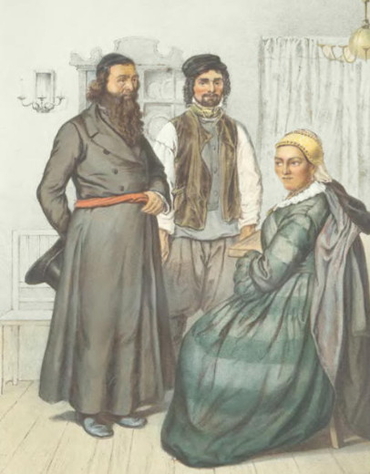Welcome to the final instalment of our latest Tale for Our Time - A Journey through the Bucovina by Sir Sacheverell Sitwell. In tonight's concluding episode, having addressed the various cross-currents of Catholic and Orthodox, Mongol and Habsburg, the author turns finally to the question of the Jews, with whom, in 1937, the Bucovina was abundantly endowed:
Cernăuți has been described as a predominantly Jewish town; all the business is in the hands of Jews, but it is to Cernăuți, the capital, that all the Jews with ability or ambition will have gone. At the earliest moment they leave the provincial towns and make for the greatest local centre of population, leaving behind them their older relations and those of their race who are lacking in enterprise. From Cernăuți, whenever it is possible, they migrate to America. Before the War, when Cernăuți was in the Austrian Empire, there was always Vienna for purposes of education, and for the making of money. Now the Jews are confined to their own small province...
We have had cause to reflect here on various consequences of the collapse of the Habsburg Empire, but certainly Jews in the Bucovina and elsewhere felt the loss of Vienna, a great imperial capital and a great Jewish city. Sir Sacheverell touches on various prospects advanced at the time - the creation of a Jewish homeland in French Madagascar, for example. Within five years of his journey, the point would be moot, for the Jews would be gone from the Bucovina and far beyond, never to return. In 1937, Jews made up over a third of the population of Cernăuți, by some distance the city's largest demographic; in today's Chernivtsi, they are below two per cent.
Members of The Mark Steyn Club can hear me read the conclusion of A Journey through the Bucovina simply by clicking here and logging-in. Earlier episodes can be found here.
We always get questions about the accompanying music to our Tales. For this selection, I chose Sholom Secunda, born in Kherson, then in the Russian Empire, latterly in Ukraine, and since last week back in a new Russian Empire. The lyrics go:
Vu iz dus gesele? Vu iz di shtib?
Vu iz dus meydele wemen ich hob lieb?
Which means:
Where is the little street? Where is the house?
Where is the little girl I love?
For Jews - and for Austrians and any number of other ethnic groups returning to what is now Ukraine - that's a question you can ask all over the map: Even more than other parts of Europe, it is a land of ghosts.
Sholom Secunda emigrated to America and (with an English lyric by Sammy Cahn) had the all-time biggest hit song to come out of the Yiddish theatre:
Thank you so much for your compliments about Tales for Our Time during these hellish times. Some like the ripping yarns for boys, some the more genteel social comedy for girls, and some of you even enjoyed our bit of summer whimsy from yours truly. But of the tales in totality all seem to be in favour.
If you've yet to hear any of our Tales, you can enjoy four-and-a-half years' worth of audio adventures - by Conan Doyle, Kafka, Conrad, Gogol, Dickens, Baroness Orczy, P G Wodehouse, Jane Austen, George Orwell, Robert Louis Stevenson and more - by joining The Mark Steyn Club. For details on membership, see here - and, if you're seeking the perfect gift for a fan of classic fiction, don't forget our Steyn Club Gift Membership. Sign up that special someone today!
See you very soon for another Tale for Our Time.

